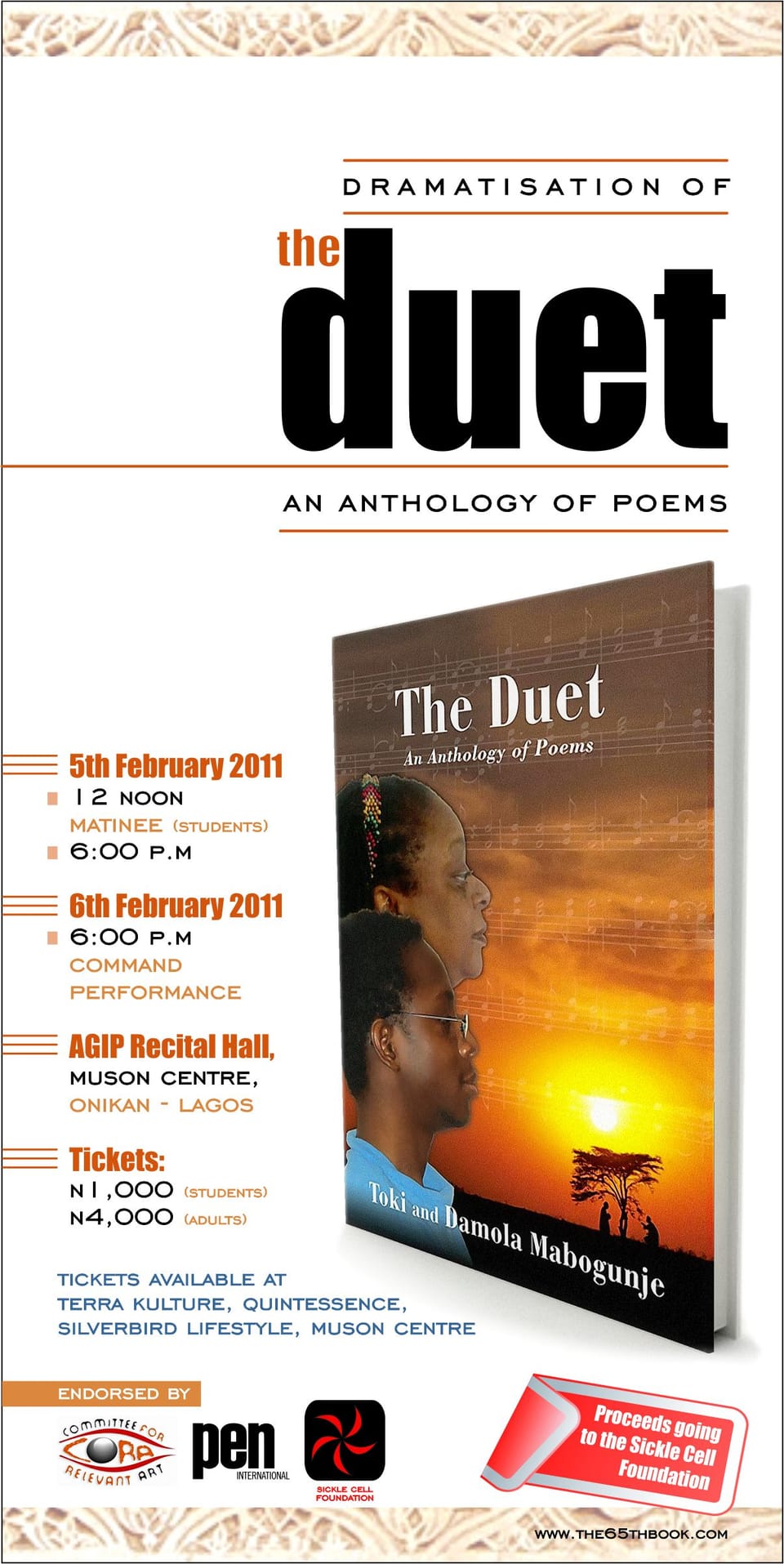2 Days, 2 Nights, Too Marvelous

The Duet was staged three times over the course of two days, and two nights at the Musical Society of Nigeria (MUSON) in Onikan, Lagos. On the 5th of February, there was an afternoon matinee for students and an evening show for the general public. The following evening was the command performance. It was a charitable affair for which all tickets were sold for the affordable price of N4,000 with the optional N10,000 special invitation available for those who wished to donate more. All proceeds were donated to the Sickle Cell Foundation of Nigeria.
The event was also endorsed by the Comittee for Relevant Art (CORA) and the organisation of Poets, Essayists, and Novelists (PEN International) and although it was held in honour of my mother's 50th birthday, it's intimations were much more significant than that. For at the end of it all, when we gave our vote of thanks we made them all clear - and the message was threefold
- That Sickle Cell Anaemia is a major disease currently afflicting a vast population of Nigerians like myself and we need to do something about it - starting with supporting those who are already doing something like the Sickle Cell Foundation
- That we should support the literary and performance arts in Nigeria. They are powerful tools which can be agents of change and although talented individuals abound, the arts and the professionals who engage in them will disappear without our patronage.
- That we should aid our youth in becoming the best they can be. Should they take an interest in the arts, we ought to encourage them, nurture them, and let them grow in their art - be it as a hobby or as a profession.
The show featured 10 scenes, and out of a total of 43 poems in the book, a whopping 30 poems were dramatised. Each poem was practically recited word for word within a kaleidoscope of dance, drama, and culture, that provided a contextual backdrop to the very words themselves; driving home the deeper messages they carried. There were no breaks and no intermissions, as each act flowed seamlessly into the next. Often moving from solemn monologues to vibrantly colourful cultural dance and song or to short enactments of the poems in context.
Each of the scenes embodied a simple and singular theme, and each of its poems delivered messages about that theme. Emotions from hope to despair, celebration to grief, outrage to reverie, and anger to love were evoked by the poems in motion. Topics from racism to religion, death to democracy, and relationships to remembrance were touched upon and addressed. Giving one a wholesome view of life as seen from the eyes of a child, a youth, and an adult. My poems spanned the ages 9 to 19 while my mother's were drawn from her adult life. Yet the messages seemed to speak across ages, across races, and across all human boundaries of heart and mind. Even for me who wrote about half of the poems performed, my poems just as much as my mother's said things to me that I hadn't appreciated in a long time.
The whole performance took no longer than an hour and a half, from 6pm to 7:30pm; and for those who had read the book and those who hadn't, those who inspired the poems and those who didn't, those who were personally tied to the authors or performers and those who weren't, for the authors themselves, the actors, the director, and the producers, the Duet on stage was a marvel to behold.
All this after over three months of rehearsals and practice by the cast and crew, and almost a year of planning by my mother, Toki Mabogunje - the producer - and Mr. William Ekpo - the theatre director as well as the contributions of my father, Seun Mabogunje - the executive producer.
